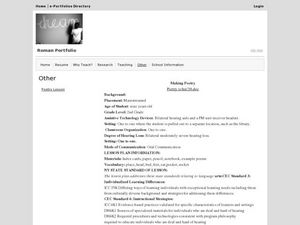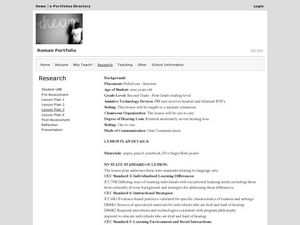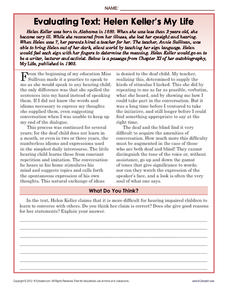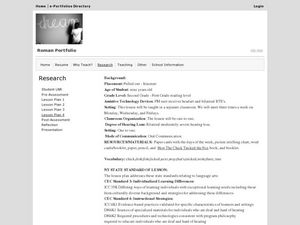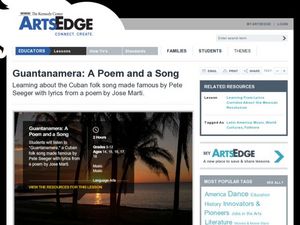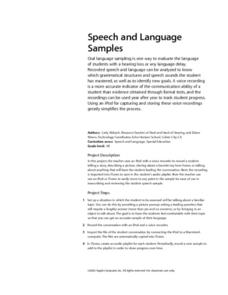Curated OER
ASL: Lesson 13
Ever consider becoming an interpreter for a special needs or hearing impaired pupil? ASL lesson 13 focuses on becoming an interpreter and also on research. Included are many links to visual aids and video intended to guide your signing...
Curated OER
Hearing The Warning Bells
Explore hearing loss and ways in which technology can help the hearing impaired by experiencing a simulation of hearing impairment and by researching in order to present related topics. Learners will also investigate and evaluate dangers...
Curated OER
How Do I know That a Book Is Just Right for Me to Read?
Learners choose a book for reading. In this language arts lesson, students take steps to evaluate a book for free reading. Learners make a list of words found in the book that they are unfamiliar with.
Curated OER
Turn Down Music to Save Hearing
Students participate in a informal survey of their listening habits, then read a news article about the possibility of portable music players harming kids hearing. In this current events lesson, the teacher introduces the article with a...
Curated OER
ASL: Lesson 10
Focus on learning how to sign cardinal and ordinal numbers, nouns, and lexicalized fingerspelling. Here is lesson 10 of the series on learning ASL. Provided, are multiple links that provide a visual guide to proper signing. Teach your...
Possibilities
Disability Awareness Activity Packet
Bring awareness to disabilities with a packet consisting of a variety of activities designed to inform scholars about disabilities—autism, hearing impairments, physical disabilities, and more! Learners test their communication skills,...
Curated OER
ASL: Lesson 15
ASL is fun to learn and now so easy! This is lesson 15 in a series of 30+ lessons of learning or teaching ASL in a comprehensible and strategic way. Use this lesson to reinforce identifying community helpers and conducting an interview....
Curated OER
For iPod Users, a Budding Problem
Students explore hearing loss in teens. In this health journalism lesson, students read the USA Today article titled "For iPod Users, a Budding Problem," respond to discussion questions regarding the article, and complete an activity...
Curated OER
Physics of Sound: How We Hear Sounds
Second graders identify the different function and parts of the ear. In this physics lesson, 2nd graders explain how we hear sound. They read about the life of Helen Keller and respond to questions that follow.
Curated OER
Making Poetry
A hearing impaired student identifies rhyming words. In this rhyming word lesson for the hearing impaired, 2nd graders read and write poetry correctly using rhyming words.
Curated OER
Learning to Summarize a Story
Learners with hearing loss read independently and understand what is being read to them. For this independent reading lesson plan, students sequence and discuss the book that is read.
Curated OER
Physics of Sound: How We Hear Sounds
Students examine the way they hear sounds. In groups, they label and identify the functions of the different parts of the ear. After reading a book by Helen Keller, they research the mechanisms of sound and how sounds are different...
Curated OER
TE Activity: Sound Line
Students investigate the decibel readings of various noises. They determine why high-level readings damage hearing. Students arrange sound from the lowest to highest decibel levels when they written on a piece of paper.
Curated OER
Understanding and Stay Interested in Reading
Second graders make predictions about reading. In this remedial reading lesson, 2nd graders read a favorite author's story, and read about an animal or favorite hobby or how-to. Students discuss the various purposes for the different...
K12 Reader
Evaluating Text: Helen Keller's "My Life"
Readers are asked to evaluate Helen Keller's claim, and the evidence she uses to support her argument, that it is more difficult for hearing impaired children to learn to talk with others.
Perkins School for the Blind
Conductors of Heat - Hot Spoons
Why is the end of a spoon hot when it's not all the way in the hot water? A great question deserves a great answer, and learners with visual impairments will use their auditory and tactile senses to get that answer. A talking...
Curated OER
Roman Portfolio
Student practice decoding skills and phonological awareness. In this vocabulary development lesson, student identifies new vocabulary through word association and flash cards. Student also reads How he Chick Tricked the Fox making...
Curated OER
Helen Keller- Book Marks
Students learn about the life of Helen Keller. In this cultural and disability awareness lesson, students read a biography about Helen Keller and discuss the differences in her life and theirs. Students discuss which sense they would...
Curated OER
Understanding to Read and Describe It
Second graders, with hearing disability, practice vocabulary building strategies. For this vocabulary strategy lesson, a student practices sight words using word cards. The student verbalizes a sentence with the new words while the...
Curated OER
Lesson Plan Anchored Instruction
Students explore a case study of a hearing impaired person. They evaluate obstacles the patient may face in a school setting. Students determine strategies to help the patient adapt to his hearing loss. They present their solutions to...
Curated OER
Sound All Around Us
Students make predictions about how sound is formed. They view and discuss a video that explores sound formation and attempt to identify the origin of different sounds.
Curated OER
Turn on the Light, Thomas Edison by Peter and Connie Roop
In this literature worksheet, 5th graders read the novel Turn on the Light, Thomas Edison by Peter and Connie Roop and then answer ten reading comprehension questions about the novel.
Curated OER
Guantanamera: A Poem and a Song
Students compare revolutionary actions of Jose Marti and Pete Seeger. In this Cuban folk song lesson, students listen to the song "Guantanamera" and discuss the content. Students read articles on the poet and the songwriter and create a...
Curated OER
Speech and Language Samples
Students tell a story, describe a picture, share about a favorite toy from home and are recorded using an iPod with a voice recorder. They create a playlist of their voice and reading samples to illustrate progression over time.











